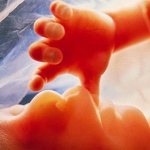This is a more comprehensive version of an article that appeared in “Family World News” and “The Catholic Weekly.”
Some sense of the greatness of marriage as a bond between a man and a woman and its link to the development of community life exists in all cultures. Aristotle, for example, regarded marriage and strong families as essential to the right ordering of society and for the proper socialisation of children. He saw the friendship and the bond between the married couple, together with the natural bond of affection linking them to their children, as an important factor conducive to the development of those virtues upon which peaceful coexistence between the members of society depends.
Marriage and Natural Moral Law
Marriage, and the family based on it, is not an exclusively Christian institution since it is an expression of God’s plan for humanity. As such, the natural moral law makes clear the foundational role of marriage in society and the essential moral principles relating to it. St. Thomas Aquinas stated that the natural law “is nothing other than the light of understanding placed in us by God; through it we know what we must do and what we must avoid. God has given us this light or law at creation.”1
For peace and freedom to flourish in society, citizens must be governed by rules or laws that are in harmony with the tenets of natural justice. These tenets of natural justice lie at the heart of natural moral law. This moral law is called ‘natural’ because it is discernible to reason, something which is proper to human nature. It affirms that there are moral norms which in their universally binding character transcend the customs and laws of any given community.
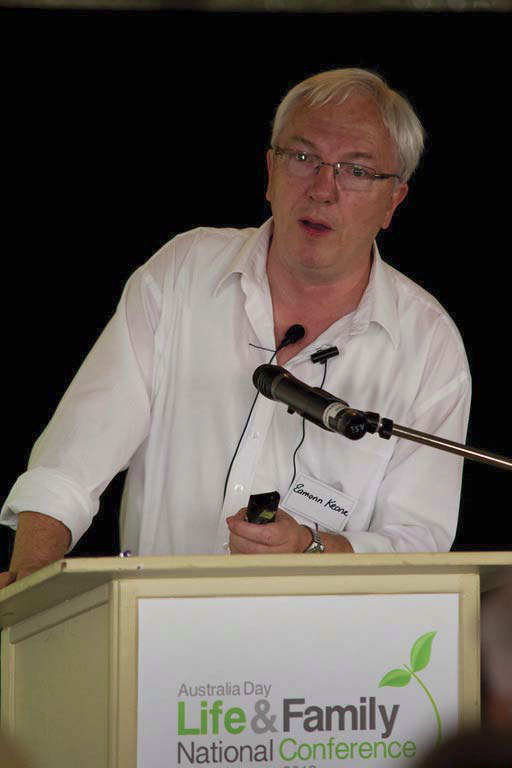
Eamonn Keane
In referring to the natural moral law, Aristotle said: “There is in nature a common principle of the just and unjust that all people in some way divine, even if they have no association or commerce with each other.”2 Cicero (106-43 BC) pointed out that if positive law (laws made by society to govern its people) contradicts the natural law, this will mean the destruction of the foundations upon which civilized society rests.3 In attributing the natural moral law to the wisdom of a Creator God he said:
“True law is right reason in agreement with nature; it is of universal application, unchanging and everlasting; it summons to duty by its commands, and averts from wrongdoing by its prohibitions… We cannot be freed from its obligations by senate or people…There will not be different laws at Rome and at Athens, or different laws now and in the future, but one eternal and unchangeable law will be valid for all nations and all times, and there will be one master and ruler, that is, God, over us all, for he is the author of this law, its promulgator and its enforcing judge. Whoever is disobedient is . eeing from himself and denying his human nature.”4
In his book, The Abolition of Man, C. S. Lewis marshalled evidence from ancient Egyptian, Jewish, Babylonian, Hindu, Chinese, Greek, Roman and other sources which pointed to the existence of the natural moral law as the foundation of morality. He argued that the necessary consequence of the spread of moral relativism would be “the destruction of the society which accepts it.”5
Lewis pointed out that the Natural Law, which he termed Tao, and to which others have referred to as Practical Reason, is not simply “one among a series of possible systems of value,” but rather “is the sole source of all value judgments.”6 He stated that an “open mind” on this question is “idiocy” and insisted that “the human mind has no more power of inventing a new value than of imagining a new primary color, or, indeed, of creating a new sun and a new sky for it to move in.”7
The natural law and the objective moral principles it points to allows us to live in accord with our dignity and is the basis upon which the inalienable rights of every human being can be guaranteed. As against this, moral relativism gives rise to the absurd notion that all beliefs and lifestyles are of equal value. In societies where objective principles of morality are set aside in favour of relativism, those who wield power must of necessity presume to be the final arbiters of the distinction between good and evil, thereby paving the way for totalitarianism.
The natural law indicates that marriage is not the product of some causeless and purposeless evolution. Neither can it be regarded as mythic putty, something whose form can be redesigned at will. The natural law points to marriage as a lifelong union between one man and one woman to the exclusion of all others. It also points to an intrinsic link between marriage and human procreation. These two meanings of marriage, the unitive and procreative, were generally accepted as self-evident truths throughout the history of Western civilisation up until relatively recent times.
Divine Revelation and Marriage
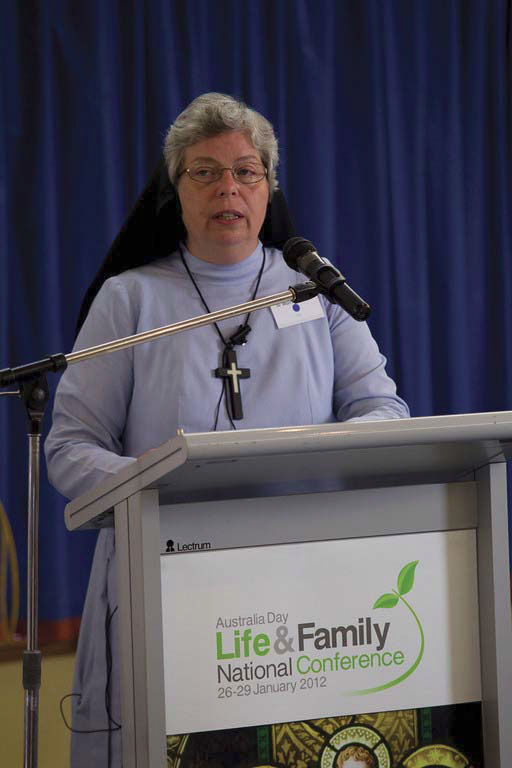
Sister Moira de Bono
The moral principles regarding marriage indicated by the natural moral law were further illuminated by the Judaeo-Christian revelation of the truth about who God is and about His plan for marriage. Pope Paul VI described this connection between God’s self-revelation and the meaning of marriage when he said: “Marital love reveals its true nature and nobility when it is considered in its supreme origin, God, Who is Love (cf. 1 Jn 4:8)” (Humanae Vitae, n. 8)
The duality of the sexes was willed by God – “male and female he created them” (Gen 1:27). In marriage, a man and a woman are called to give themselves as an irrevocable gift to each other: “Therefore a man leaves his father and his mother and clings to his wife” (Gen 1:24). Like God, man and woman together in marriage are called to be a source of new life: “Be fruitful and multiply, and .ll the earth and subdue it” (Gen 1:28). God inscribes this capacity of husband and wife to cooperate with Him in bringing new human beings into existence in the act of marital sexual union. This “one flesh” (Gen 2:24) sexual union expresses the full import of what is entailed in the marital covenant, whereby the husband and wife freely consent to giving themselves as an irrevocable gift to each other in the full truth of their masculinity and femininity.
These goods which God has inscribed in marriage – the faithful love and indissoluble communion of life rooted in the natural complementarity that exists between man and woman, and which is exclusive and open to new life – are all an expression of the creative love and wisdom of God. Respect for these goods is essential for a correct understanding of Jesus’ de. nitive teaching on marriage which is: “What therefore God has joined together, let no man put asunder” (Mt 19:6).
Christian marriage differs from marriage in general in that Christ has raised it to the dignity of a sacrament. This means that marriage between two Christians is a sign of Christ’s life-giving love for His Church. At the same time, the central mystery of Christian faith is that God is Three and God is One. Referring to this, the Catechism of the Catholic Church (CCC) says: “God has revealed his innermost secret: God himself is an eternal exchange of love, Father, Son and Holy Spirit, and he has destined us to share in that exchange” (CCC, 221).
The CCC also teaches that “God’s works reveal who he is in himself; the mystery of his inmost being enlightens our understanding of all his works” (n. 236). This is true also of the meaning of marriage, its ultimate meaning is located in the life of the Blessed Trinity.
Hence did Blessed Pope John Paul II state that “through the communion of persons which man and woman form right from the beginning,” they are thus constituted as “an image of the inscrutable divine communion of persons.”8
Attacking Marriage – A Crime against Humanity
It is true that unaided reason cannot rise to an understanding of marriage as a reality rooted in the interior life of the Blessed Trinity, since this truth had to be revealed by God and is accepted in faith. This does not mean, however, that revealed truth is contrary to reason, but rather that Divine Revelation raises to a new height reason’s capacity to know and ponder the truth of things.
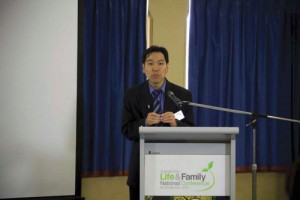
Dr. Andrew Foong
Coming back now to marriage as a natural institution, whereby the moral principles governing it are derived from the natural moral law, since marriage and family life are integral to our human nature and to human flourishing, then the moral principles regarding it must be the same for all people since we all have the same nature.
In his book titled The Home We Build Together (Continuum, 2007), Jonathan Sacks, Chief Rabbi of the United Hebrew Congregations of Britain and the Commonwealth says:
“Overwhelmingly the evidence points to the fact that the breakdown of marriage is slowly destroying Western civilisation…Yet we have developed almost impregnable defences against reversing the trend. Politicians moralise at their peril. Parliament is not a pulpit. Legislation is not ethical education. To defend one way of life as more likely to lead to happiness than others is to risk accusations of being judgemental…The fact that we have deconstructed the family – morally, psychologically, economically, politically – is the single most fateful cultural development of our times” (pp. 212-213)
Legislators are called to make laws regulating the rights and duties of citizens for the sake of the common good. To this end they must seek to foster conditions in society that will allow people, either as individuals or in groups, to reach human fulfilment more easily and more fully. The acceptance of objective moral principles, which are derived from the natural law, are an inescapable requirement for living in accord with one’s own dignity and are the bases upon which the inalienable rights of every person can be guaranteed. Without such a consensus of commonly held objective moral principles, society cannot hold together.
Regarding the relationship between positive law and the natural law, St. Thomas Aquinas said: “Human law has the nature of law insofar as it partakes of right reason; and it is clear that, in this respect, it is derived from the eternal law. But insofar as it deviates from reason, it is called unjust law, and has the nature, not of law, but of violence.”9
Moral relativism turns the subjective ego into a little god and gives rise to the absurd notion that society can prosper while holding all beliefs and lifestyles to be of equal value. In such a milieu, permissiveness and indulgence swamp true concepts of justice. In light of this, it is wholly inadequate to think of democracy only in terms of electoral, political, legislative and judicial processes that give expression to the will of the majority. The State acts unjustly when it introduces laws which are in violation of the dignity and inalienable rights of human beings. Therefore positive law can never be used in such a way that it violates the absolute requirements of the natural moral law. If democracies do not acknowledge the existence of absolute and universally binding moral norms, which are foundational to any right notion of inalienable human rights, then they are doomed to collapse into new forms of totalitarianism.
When lawmakers denigrate the meaning of marriage by granting legal status to surrogate forms of it, such as ‘same-sex marriage’, they thereby send their nations spiralling downwards into an abyss of inhumanity. They falsify the meaning of marriage for the present generation and the ones following. The educative impact of such legislation is devastating to the extent that it encourages individuals to choose vice over virtue. The poet Alexander Pope (1688-1744) described this process well when he wrote:
“Vice is a monster of so frightful mien
As to be hated needs but to be seen;
Yet seen too oft, familiar with her face,
We first endure, then pity, then embrace.”
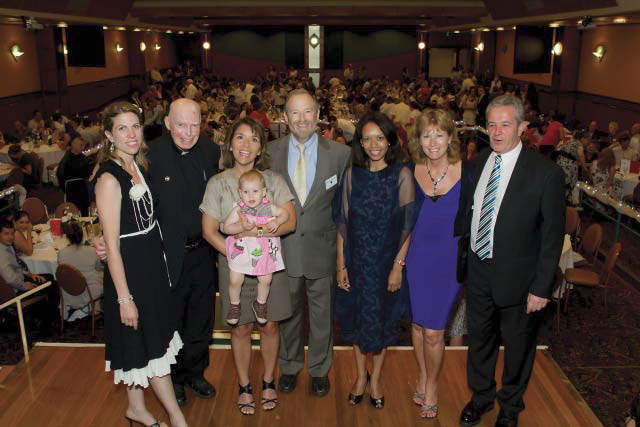
L-R: Peta Evans, Mons.Reilly, Vera Mosher holding Therese Griffin, Steven Mosher, Maria Campos, Christine and Paul Hanrahan
When legislators introduce laws allowing homosexual or lesbian couples to adopt children they thereby violate the fundamental rights of the children involved by systematically denying them the right to either a father or a mother. In doing so they commit further violence against the children by deliberately placing them in a nurturing environment where the immoral lifestyles of the gay or lesbian couple adopting the children will be a source of scandal to them. On the basis of all this, gay adoption can be seen to be nothing less than an aberration of the true meaning of human rights; it sacri.ces innocent children on the altar of human capriciousness and moral relativism. Legislators introducing such laws and those who vote in favour of them are responsible for the institutionalisation of crimes against humanity.
Aggressive Secularism
Western nations are now facing multiple crises including high divorce rates, low birth rates combined with aging and imploding populations, rising abortion rates, increasing demand for the legalization of euthanasia, high levels of unemployment and unsustainable budget deficits in many countries. While there are no doubt many factors contributing to this regrettable state of affairs, I think a primary cause is the decline in Christian belief and practice.
Religious belief and practice are important elements in the rise and fall of civilizations. Referring to this, Cicero, one of the greatest lawyers and philosophers of Roman antiquity stated: “You, the priests, are protecting Rome with religion more effectively than she is protected with walls.”10
Few historians have devoted as much attention to the relationship between the development of civilizations and religious belief as Christopher Dawson (1889-1970). Widely regarded as one of the most important cultural historians and philosophers of history in the twentieth century, Dawson recognized that it was the religious and philosophical underpinnings of a culture that formed the understanding of reality of the majority of citizens and which thereby gave it its moral tone and orientation. He pointed out that when a society becomes secularized, it thereby undermines its foundations by exhausting the spiritual capital that inspired it.
While over the last two decades Australia has experienced high rates of economic growth when compared to other Western countries, it has however during the same period witnessed the rise of an aggressive secularism. This evil ideology fosters the idea that God is extraneous to human affairs and that religious belief and moral principles anchored in objective criteria have no relevance in modern society. Religion is held as belonging exclusively to the private domain and morality is largely a question of personal preference rather than something inextricably linked to the objective good or evil inherent in freely chosen acts.
The conflict between aggressive secularism and the Judaic-Christian understanding of reality now revolves most prominently around questions relating to contraception, abortion, euthanasia, same-sex marriage and gay adoption. These questions should not be understood as marginal to the political process, rather they go to the heart of what it means to be a civilized and humane society. At base the questions have to do with the ultimate meaning of human life – are we truly children of an all wise and loving God, or are we at best only educated apes with no destiny beyond the grave?
Eamonn Keane is married with five children and has six grandchildren. He is Head of Social Science at Redfield College in Sydney.
Footnotes:
1. St. Thomas Aquinas, Collationes in decem praeceptis, I.
2 Aristotle, On Rhetoric, Book 1, Chapter 13.
3 Cicero, De Legibus (in De Republica, De Legibus, with English translation by Clinton Keys) Heinemann, London, 1961, p. 211.
4 Ibid. p. 345.
5 C.S. Lewis, The Abolition of Man, Collins Fount
Paperbacks. Glasgow 1990, p. 21
6 Ibid.
7 Ibid. pp. 30-31.
8 Blessed Pope John Paul II, Original Unity of Man and Woman, General Audience, November 14, 1979.
9 St. Thomas Aquinas, Summa Theologiae, I-II, q.93, ad. 2.
10 Cicero, De Natura Deorum 111, 40.





